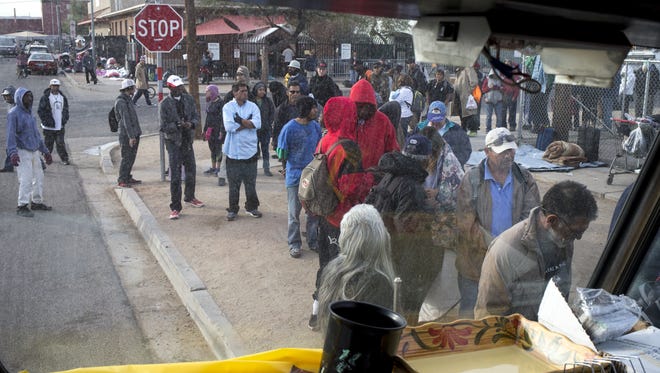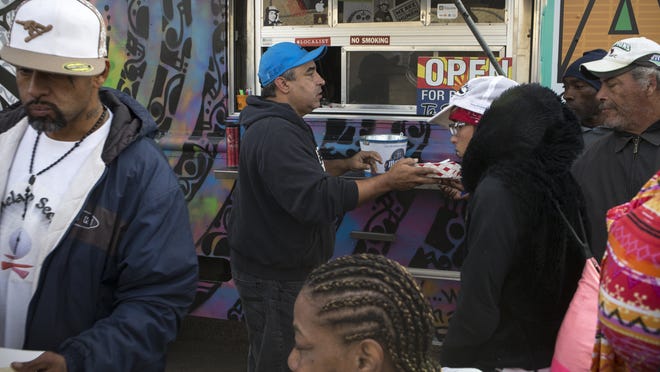Cities Where It is Illegal to Feed the Homeless 2016

The city of Phoenix delivered a message to Life Elevation Church last year that Lead Pastor Cedrick Carter said was hard for members to hear: Handing out food and clothes at Sunnyslope parks wasn't helping the homeless people their faith called them to serve.
Food is a vehicle to reach those in need, Carter said, and days at the park allowed church members topray with people and build relationships. Ending the events seemed like abandoning a Christian mission, he said.
But the Avondale church worked with the city to completely change its approach, he said, and now partners each month with the Society of St. Vincent de Paul. This holiday season, Carter said, he's seen the impact of the type of giving his church used to do.
Established organizations have no shortage of food for those in need over Thanksgiving and Christmas, Carter said. And in December, he saw an influx in street-side donations pull people away from the monthly meal and service his church offers with St. Vincent year-round.
"It looks different when you see it from that side," Carter said.
Though controversial, the change is one Phoenix is encouraging for religious and community organizations who lead "street feeding," or offer food and supplies unconnected to service providers. A group organized earlier this year seeks a different approach, particularly over the holidays, when giving soars outside the campus of homelessness organizations near downtown Phoenix.
The city is calling the few dozen organizations the Success off the Streets Collaborative. Members are encouraging groups to trade street feeding for work with licensed providers, or to support formerly homeless people once they are housed.
Phoenix has no plans to strengthen policies or enforcement to prevent street feeding, said Riann Balch, deputy human-services and family-advocacy center director. But the city is working to educate organizations about the disruptions it can cause regarding safety, waste and the ability of providers to engage people about ending their homelessness, she said.
That message is rejected by some organizations who don't believe distributing food perpetuates homelessness. Other groups say the city should have no role in deciding how people give. Even some churches who adopted the city's stance said the transition has been tough.
Carter said he understands why Phoenix's position is difficult for some faith-based organizations. But he thinks the groups can find more productive ways to address homelessness if they work with each other — and the city.
"The more we heard — the more we listened — we understood," Carter said.
Help becomes disruption

The heart of Phoenix's message is that street donations aren't helping people end their homelessness. Instead, they disrupt the efforts of the city and other groups to provide a long-term solution, Balch said.
The city works with a variety of other organizations to engage people experiencing homelessness using a "housing first" model that provides them a place to live before addressing other needs. Efforts and resources ramped up after the Human Services Campus at 12th Avenue and Madison Street changed its overflow shelter strategy last year after closing an old warehouse and fenced-off parking lot where people used to sleep.
That model relies on bringing people into a system that will help them, Balch said. Efforts are complicated when people know where they can meet their basic needs without interacting, she said.
As a steady stream of people cycled through the St. Vincent de Paul dining room at the campus for eggs, toast and potatoes on a recent morning, dozens more stayed outside under blankets or inside tents lining 12th Avenue and surrounding streets.
With street donations, people without shelter can start to collect items and "bed down" in the area, Balch said. They become less mobile and sometimes more adverse to leaving encampments, she said.
"It's even more difficult for us to engage them and bring them inside," Balch said.
It's a year-round issue at the campus, Managing Director David Bridge said. But Thanksgiving launches a period of holiday giving that brings thousands of people carrying donations to the neighborhood, he said.
The crowds bring logistical challenges. Trash and leftover food cause blight in the area, Bridge said.
The city needs extra police to keep distribution safe, Balch said. A person might save leftovers and get sick after eating them. People congregating where groups regularly serve meals create concerns for nearby neighborhoods and businesses.
Phoenix appreciates the giving, Balch said, but wants to redirect it. The city launched a website of licensed organizations those seeking to help can partner with.
Additional opportunities include providing holiday-meal supplies to recently rehoused people, or donating starter kits of home essentials.
"We're just looking for ways that are better for everybody," Bridge said.
'I will not stop'

But some people who distribute food near downtown say they are providing a service for people in need. Homelessness numbers are hard to calculate, but Maricopa County's 2016 point-in-time survey — a regional one-night count of homeless people — put the population at 5,702 individuals.
Nearly a third of those people were not staying in a shelter. The unsheltered population is up about 27 percent from the 2015 count but lower than it was five years ago. The survey doesn't provide enough information to determine why, though rising housing costs is one guess of service providers, said Anne Scott, human-services planner for the Maricopa Association of Governments, which coordinates the survey.
The efficacy of outreach teams tasked with finding homeless people outside of shelters also could have affected the street count, Scott said.
But Scott said she thinks "there's concern in the community homelessness is increasing."
Michael Reyes, owner of the Paz Cantina food truck, said he has a social responsibility to offer free breakfast burritos and bowls to people who could use them. He said he has heard Phoenix's street-feeding message but has no plans to stop his weekly "Grateful Tuesday" food-distribution event outside the Human Services Campus.
Fresh food and supplies like blankets and socks don't just fill the gaps in what other organizations offer, Reyes said. They come with the message that people who are down matter and are part of the community, he said.
It's a service Reyes said he doesn't need permission to provide.
"I will not stop," Reyes said. "I will do it more."
Street-feeding bans or discouragement are controversial throughout the country. A recent report by the National Law Center on Homelessness and Poverty found 6 percent of cities surveyed restrict publicly sharing food, but that outright bans have faced successful legal challenges.
In Phoenix, the Human Services Campus is in an area where "unscreened charitable outdoor food serving" is prohibited, though the ban is unenforced. Still, the anti-street-feeding message alone comes across as dehumanizing, said Amy McMullen, co-founder of the Maricopa Alliance for Shelter and Housing.
McMullen said shifting street feeding inside has no impact on the root causes of homelessness, and disagrees that it enables people to stay unsheltered. People should be able to give food to people who need it outside if they are compelled to do so, she said.
"I don't think it's up to the city," McMullen said.
The donations are an extra resource for people like Andy Reiter, who has stayed at Central Arizona Shelter Services for the past five months. Reiter, 45, said he is ready to sign a lease for housing and uses campus services in addition to benefiting from the clothes, shoes and other items provided outside the campus by "really good people."
For every service on the campus, there are hundreds of people who could use it, Reiter said.
"There are so many people who need so much," Reiter said.
Some groups worry about what will happen to people who aren't connected to licensed organizations. The Phoenix Dream Center, an organization that provides a variety of services to homeless and at-risk people, stopped its regular meal service near the campus months ago based on the city's input.
The center sees merit in Phoenix's message, Executive Director Brian Steele said. Volunteers now partner with St. Vincent de Paul.
Their distribution and outreach efforts continue elsewhere in the Valley, Steele said. But near the campus, Steele realized faith organizations had inadvertently created a separate system outside of existing services, he said.
The Phoenix Dream Center, though, is still considering how to help people in the area who are on the fringe. He said that population is still out there — but now with fewer resources.
"Our hearts really kind of do hurt a little bit," Steele said.
Doing 'God's work'
Other faith groups changing their approaches said the transition can be tough, but that they see new opportunities in how to help homeless people.
Church for the Nations was disheartened when Phoenix asked them to stop giving food topeople in parks a few years ago, said outreach pastor Lindsay Winebarger.
The church listened, though, and shifted its events to its north-central campus. The church was inspired to funnel its resources more effectively to eradicate poverty, Winebarger said, and is launching a program to mentor homeless families.
Volunteers are undergoing training and will "be a friend" to the chronically homeless families moving into public housing. The church wants to work with the city on a common vision rather than fight against it, Winebarger said.
"If we all come together, we can do something great," she said.
A new non-profit called reKindle also is expanding its efforts to go beyond "just stuff," said Chris Hooley, who co-founded the organization with his young daughter. ReKindle started by hosting a monthly "Second Chance Saturday" outside the Human Services Campus to provide people with supplies like backpacks, a chance to hug volunteers and services like haircuts or massages.
Those events will continue, though Phoenix has influenced what is offered at them, Hooley said. But now, Hooley hopes to launch the "Work First" program piloted this fall.
The idea is to engage homeless people before they are ready to work with employment organizations, Hooley said. Participants who complete a daylong beautification project receive lunch, a prepaid gift card and the chance to learn a new skill.
The changes have also boostedSt. Vincent de Paul, said Jerry Castro, director of Food Services. Phoenix is referring street-feeding organizations to work with the provider, among others.
The volunteers and donations fulfill a need for St. Vincent, which serves thousands of meals around the Valley each week to anyone who arrives, Castro said. The dining room at the Human Services Campus also doubles as an overflow shelter at night.
Castro said he encourages people to work with the organization to distribute clothing in its lobby, or minister in the facility. It keeps the surrounding area cleaner than when that's done outside, he said.
Some groups appreciate the increased safety and structure partnering with the organization instead of on the street, Castro said. He said he has seen some faith groups connect more closely with people to help them find work or other services to help "get them going."
"To me, that's God's work," Castro said.
Source: https://www.azcentral.com/story/news/local/phoenix/2016/12/22/phoenix-some-efforts-help-homeless-people-actually-hurt-street-feeding/95530580/